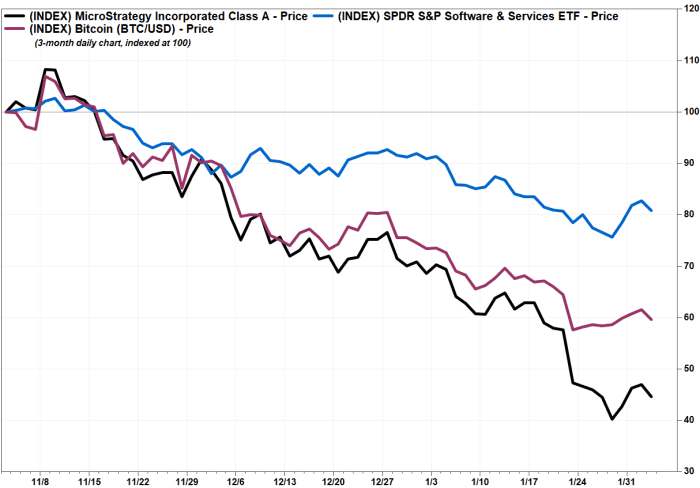This post was originally published on this site
Shares of MicroStrategy Inc. sank Wednesday, after the software company-slash-bitcoin play reported a surprisingly large quarterly loss, as a near $150 million loss booked on its cryptocurrency holdings offset strength in its software business.
Despite the losses, Chief Financial Officer Phong Le touted the company’s “pioneering decision” to make bitcoin its primary treasury reserve asset. He said the move has made MicroStrategy a “thought leader” in the cryptocurrency market, and has “generated great interest” in the company, even from its software customers.
“We believe that such market attention, when captured correctly, has helped to create software pipeline growth and sales growth,” Le said on the post-earnings conference call with analyst, according to a FactSet transcript.
The company
MSTR,
reported late Tuesday that it swung to a net loss of $89.98 million, or $8.43 a share, from net income of $2.66 million, or 27 cents a share, in the same period a year ago. That compared with the average analyst profit estimate of 89 cents a share, according to FactSet.
The results included a $146.59 million impairment loss related to its digital assets. For the year, the company recorded a digital asset impairment loss of $830.62 million, resulting in a net loss for 2021 of $535.48 million, even as the software business returned to revenue growth for the first time since 2014.
Including $70.7 million in digital asset impairment losses recorded in 2020, the company has booked cumulative losses of $901.3 million since it started buying bitcoin
BTCUSD,
in the second half of 2020.
The stock dropped 5.4% in afternoon trading. It has plunged 55.6% over the past three months, while the SPDR S&P Software & Services exchange-traded fund
XSW,
has shed 19.2%, bitcoin has tumbled 40.4% and the S&P 500 index
SPX,
has eased 0.6%.
The company it owned 124,391 bitcoins as of Dec. 31. The original costs basis was $3.752 billion, for an average market price of $30,159 per bitcoin, but the carrying value including the impairment losses recorded was $2.85 billion.
CFO Le said that given the “significant drop” in bitcoin prices in January 2022, “we will recognize significant impairment charges again in he first quarter.”
Bitcoin sank 17.2% in January, according to FactSet data, and has lost another 2.0% since then.
Don’t miss: Here’s how much bitcoin, ethereum and other crypto prices changed in January.
Chief Executive Saylor talked on the call about how he thought investors should view MicroStrategy’s stock as an attractive option to other bitcoin investments, such as exchange-traded funds.
He noted that there were currently no ETFs available that tracked “spot,” or live bitcoin prices, and said ETFs based on bitcoin futures include a “substantial cost” of more than 2% each year, and “potentially much, much higher” when the futures are rolled over.
Also read: Opinion: The SEC is illogical in its continued refusal to OK a bitcoin ETF.
“And so, if you compare us to various spot and futures ETFs, I think we compare very favorably because we are an efficient operating company,” Saylor said.
On the flip side, he said investors should consider valuing the company based on its software business, which is actually growing and generating cash. That makes sense, since the software sector has outperformed bitcoin by a wide margin in recent months.

FactSet, MarketWatch
“When you’re considering MicroStrategy, clearly you can look at us as a software company and I think people are going to evaluate our revenue growth rate,” Saylor said. “They’re going to look at our ability to generate free cash flow, our efficiency.”
Meanwhile, Saylor said the company is still considering what to do with its bitcoin holdings, and how to use them to benefit shareholders.
The company said that of the 125,051 bitcoins held as of Jan. 31, more than 110,000 were not pledged as collateral for debt.
“[W]e haven’t really decided on anything and we don’t have any particular intent right now,” Saylor said on the analysts call. “But the option to pursue either leverage or yield, or other kinds of strategic partnerships using our billions of dollar of bitcoin, I think, is very important…and it’s an important benefit to our shareholders, and it’s a way in which we will look to build shareholder value.”
William Blair analyst Kamil Mielczarek reiterated his outperform rating on MicroStrategy, seeing this current lack of a strategy has providing a potential future catalyst.
“While the company does not have immediate plans, we do see this as a material source of upside in outer years,” Mielczarek wrote in a note to clients.
SEC discussions
On the analysts call, CFO Le commented on discussions with the Securities and Exchange Commission, regarding whether the company should include or exclude bitcoin impairment losses in adjusted financial measures. He said the company agreed with the SEC, that yes, the losses should be included.
That’s why, the company doesn’t report adjusted earnings, excluding the bitcoin impairment losses.
Read more: Why MicroStrategy plans to continue bitcoin investments amid the SEC call on future filing.
The company disclosed in its 2020 annual report how the impairment losses are calculated:
“In determining if an impairment has occurred, we consider the lowest price of one bitcoin quoted on the active exchange at any time since acquiring the specific bitcoin held,” the company stated. “If the carrying value of a bitcoin exceeds that lowest price at any time during the quarter, an impairment loss is deemed to have occurred with respect to that bitcoin in the amount equal to the difference between its carrying value and such lowest price, and subsequent increases in the price of bitcoin will not affect the carrying value of our bitcoin.”
If bitcoin prices fall below the carrying value of the bitcoins held, the company will incur an impairment charge.
The company said no gains on its bitcoins are recorded until they are realized after the bitcoins are sold.


